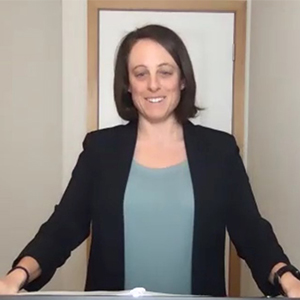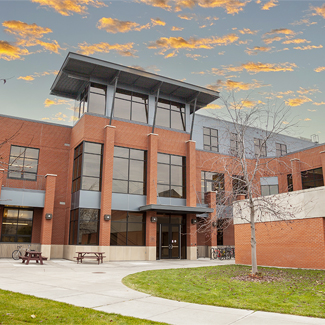Blewett School of Law National Moot Court Teams Adapt to Virtual Competitions

National moot court competitions across the nation have been held virtually over the past year due to COVID-19, and Blewett School of Law moot court teams and coaches competing in both the Jeffrey G. Miller National Environmental Moot Court Competition and the National Native American Law Students Association (NNALSA) Moot Court Competition have faced new challenges in adapting to remote preparation and competitions this semester. Despite being unable to prepare with in-person courtroom briefs and face-to-face practices, teams developed new skills and discovered a silver lining to the digital format.
Although accomplished Zoom-users by the time they began to prepare for the Jeffrey G. Miller National Environmental Moot Court Competition, students had the difficult task of simulating the courtroom in a virtual space. In order to mimic the moot court experience as much as possible, the team employed “virtual courtroom kits” to set up virtual courtrooms in their homes. Each kit consisted of a lectern, adjustable shelf to hold the computer camera at eye level, professional photography light, green screen and wireless mouse to operate Zoom from behind the lectern.
“The students adapted and operated flawlessly with this setup at the competition,” said Rebecca Smith, National Environmental Moot Court coach and adjunct professor of law.
Teams benefited greatly from holding practices over Zoom by being able to bring in guest judges from outside Missoula. National Environmental Moot Court recruited public interest environmental lawyers who had never previously guest-judged to lend students their expertise. Both public interest environmental law firms in Montana, Earthjustice of Bozeman and Western Environmental Law Center of Helena, participated.
“This was so helpful to the students that I plan to offer some remote guest-judging options in the future,” said Smith.
When it came down to the National Environmental Moot Court Competition, Blewett School of Law team members Ali Bronsdon, Collin Taylor and Kirsten Gerbatsch advanced to the quarterfinal round, beating out 25 teams from around the country. In the third preliminary round, Gerbatsch won best oralist, and Bronsdon won best rebuttal. The team also prepared a practice-level federal appellate brief on a complicated issue regarding climate change and greenhouse gas regulation under the Clean Air Act.
“The fact that the students prepared such an excellent brief and presented such excellent oral arguments despite the extreme stresses of all-remote learning, COVID-19 quarantines and pandemic-related economic hardships is a testament to their high level of skill, commitment and professionalism,” Smith said.
Another team of Blewett School of Law students also competed this semester, participating in the 29th Annual NNALSA Moot Court Competition, a contest hosted online by the University of North Dakota. Although the team developed their own courtroom approaches without kits, including using the moot court room at the law school, the team and coaches Professors Monte Mills and Kekek Stark practiced entirely via Zoom.
“Zoom limits the assessment of the body language of judge and really requires a new set of presentation skills,” said NNALSA Moot Court team member Jacqui Baldwin-LeClair. “The shift changed some of the formality required, such as requiring standing for oral arguments or the overall formal feel of proceedings in a mock supreme court setting.”
Baldwin-LeClair and her teammates Christopher Morigeau, Grace Singh and Montana Wilson squared off against over 40 other teams from around the country. The duo of Baldwin-LeClair and Morigeau advanced to the "sweet sixteen" round before being eliminated by the eventual national runners-up. The pair of Singh and Wilson also excelled in their arguments during the competition.
Like the National Environmental Moot Court team, the NNALSA Moot Court team also benefited from working with a number of guest judges during their practice rounds. Many of their current professors as well as past moot court competitors and distinguished alumni such as Lillian Alvarnez, April Youpee-Roll, Brian Upton, John Harrison, Marna Sanford and Stu Levitt joined Zoom calls to help the team prepare.
“Zoom afforded us the opportunity to have a wide variety of judges who practice in Federal Indian Law,” Baldwin-LeClair said. “This provided some great insight for me on real practice versus moot court perspectives.”
“I was particularly excited to see the attorneys from Confederated Salish and Kootenai Tribes because that is my Tribe, and I hope to work there someday,” added Morigeau.
There may not have been any travel involved in this competitions this spring or the rush of adrenaline approaching the lectern to present an argument, but the rigor and pressure of competing is the same whether in-person or virtual. Students still came away with invaluable experience. The virtual format additionally allowed them to advance their skills in remote presentation and expand professional networks with practicing attorneys throughout the state and country.
“I know I am a better oral advocate for having this experience,” said Morigeau. “Once you have faced the firing squad in those practices, it feels like you can take on just about anything.”
“The competition really built up my confidence in not only public speaking, but also speaking off the cuff to answer questions and active listening while the other counsel presents their case,” Baldwin-LeClair said. “By the last round of the competition Chris and I participated in, my nervousness largely left, and I finally felt like I had somewhat mastered the more conversational style of speaking rather than presenting a canned speech. I'm looking forward to utilizing these skills in an in-person format to see how the skills translate.”
